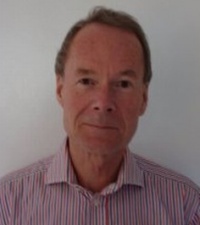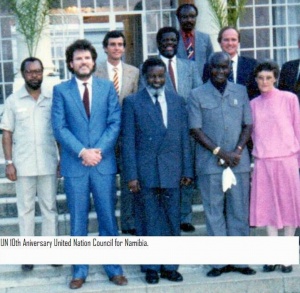Difference between revisions of "David Carter"
m |
m |
||
| (2 intermediate revisions by 2 users not shown) | |||
| Line 7: | Line 7: | ||
|description=Spooky British diplomat | |description=Spooky British diplomat | ||
|facebook=https://www.facebook.com/dcarter886 | |facebook=https://www.facebook.com/dcarter886 | ||
| + | |powerbase=http://www.powerbase.info/index.php/David_Carter | ||
| + | |alma_mater=University of Wales, Durham University | ||
|employment={{job | |employment={{job | ||
|title=Foreign and Commonwealth Office | |title=Foreign and Commonwealth Office | ||
| Line 13: | Line 15: | ||
}} | }} | ||
}} | }} | ||
| − | '''David Carter''' (born 4 May 1945) is a former British diplomat who joined the [[Information Research Department]] (IRD) | + | '''David Carter''' (born 4 May 1945) is a former British diplomat who in 1970 joined the [[Information Research Department]] (IRD) a [[Foreign and Commonwealth Office]]-funded propaganda unit whose role was likely not dissimilar to today’s [[Integrity Initiative]],<ref>''[https://www.thecanary.co/uk/2020/05/30/secret-memos-confirm-government-role-in-the-jailing-of-ricky-tomlinson/ "Secret memos confirm government role in the jailing of Ricky Tomlinson"]''</ref> and transferred to HM Diplomatic Service when the IRD was shut down in 1978 by [[UK Foreign Secretary]] [[David Owen]].<ref>''[http://www.cambridgeclarion.org/e/fo_deceit_unit_graun_27jan1978.html "David Leigh recounts the 30-year history of the Foreign Office's covert propaganda operation"]''</ref> |
Dr David Carter went on to serve in HM Diplomatic Service until he retired in 2005. Two notable postings for Dr Carter were as deputy Head of Mission at Lusaka, Zambia and at Pretoria, apartheid South Africa. | Dr David Carter went on to serve in HM Diplomatic Service until he retired in 2005. Two notable postings for Dr Carter were as deputy Head of Mission at Lusaka, Zambia and at Pretoria, apartheid South Africa. | ||
| − | Following his retirement, Dr Carter returned to academia: first to the University of Birmingham, then to Cambridge University.<ref>[http://www.lucy-cav.cam.ac.uk/pages/the-college/people/david-carter.php "Dr David Carter"]</ref> | + | Following his retirement, Dr Carter returned to academia: first to the University of Birmingham, then to Cambridge University.<ref>''[http://www.lucy-cav.cam.ac.uk/pages/the-college/people/david-carter.php "Dr David Carter"]''</ref> |
==Education== | ==Education== | ||
| Line 26: | Line 28: | ||
He returned to the FCO in 1983 and was appointed South Africa desk officer in [[Jeremy Varcoe]]'s Southern African Department (SAfD). David Carter was highly critical of the assistant desk officer [[Patrick Haseldine]]'s performance in SAfD when the [[Coventry Four]] affair erupted in March 1984. Carter ensured that [[Patrick Haseldine|Haseldine]] was seconded from the FCO to the Office of Fair Trading from 1984 to 1986. | He returned to the FCO in 1983 and was appointed South Africa desk officer in [[Jeremy Varcoe]]'s Southern African Department (SAfD). David Carter was highly critical of the assistant desk officer [[Patrick Haseldine]]'s performance in SAfD when the [[Coventry Four]] affair erupted in March 1984. Carter ensured that [[Patrick Haseldine|Haseldine]] was seconded from the FCO to the Office of Fair Trading from 1984 to 1986. | ||
| + | |||
| + | ===CAFOD seminar=== | ||
| + | Dr Carter recalled being sent in 1985 as the FCO representative to a two-day seminar on South Africa organised by the Catholic Agency for Overseas Development (CAFOD): | ||
| + | :"I learnt there what it was to be the focus of vilification! A Bishop in a plenary likened me to the representative of slave traffickers – prepared to loosen the shackles a little but nothing more. This led me to being ostracised at the bar that evening..." He summed up his experience as "like having one's teeth pulled out on a regular basis. There were real tensions, between an essentially ''verligte'' Southern African Department in the Foreign Office and a quite considerable number of what I, at least, would have viewed as ''verkrampte'' elements within the British Embassy in Pretoria/Cape Town. Of course, there were plenty of tensions within Whitehall on South Africa at that time as well."<ref>''[https://books.google.co.uk/books?id=wzIlDwAAQBAJ&pg=PR21&lpg=PR21&dq=dr+david+carter+FCO&source=bl&ots=4fR7SueiMp&sig=Mir3s0MZEyDehDLGrLXgnXXH-o4&hl=en&sa=X&ved=0ahUKEwjbgenx48_WAhVIJcAKHaObDGcQ6AEIRjAE#v=onepage&q=dr%20david%20carter%20FCO&f=false "Focus of vilification"]''</ref> | ||
===Lusaka, Zambia=== | ===Lusaka, Zambia=== | ||
| Line 31: | Line 37: | ||
In 1986, David Carter was posted to Lusaka, Zambia as Deputy High Commissioner and Head of Chancery, where he was briefed to keep tabs on [[SWAPO]]'s United Nations Institute for Namibia (UNIN) and on the [[African National Congress]] (ANC), both of which were based in Lusaka.<ref>The Diplomatic Service List 1989 (page 138), HMSO, ISBN 0-11-591707-1</ref> Pictured (right) with President [[Kenneth Kaunda]] in 1986 at State House, Lusaka are [[SWAPO]] members [[Hidipo Hamutenya]], [[Anton Lubowski]], [[Charles Courtney-Clarke]], [[Hage Geingob]] and leader [[Sam Nujoma]]. | In 1986, David Carter was posted to Lusaka, Zambia as Deputy High Commissioner and Head of Chancery, where he was briefed to keep tabs on [[SWAPO]]'s United Nations Institute for Namibia (UNIN) and on the [[African National Congress]] (ANC), both of which were based in Lusaka.<ref>The Diplomatic Service List 1989 (page 138), HMSO, ISBN 0-11-591707-1</ref> Pictured (right) with President [[Kenneth Kaunda]] in 1986 at State House, Lusaka are [[SWAPO]] members [[Hidipo Hamutenya]], [[Anton Lubowski]], [[Charles Courtney-Clarke]], [[Hage Geingob]] and leader [[Sam Nujoma]]. | ||
| − | On 19 October 1986, following a meeting with the [[ANC]] in Lusaka, Mozambican president [[Samora Machel]] was killed when his aircraft crashed in the Lebombo Mountains, near Mbuzini, South Africa. The apartheid regime was blamed for [[Samora Machel]]'s death.<ref>[http://www.bdlive.co.za/national/2012/12/12/investigation-of-samora-machels-death-reopened "Investigation of Samora Machel’s death reopened"]</ref> | + | On 19 October 1986, following a meeting with the [[ANC]] in Lusaka, Mozambican president [[Samora Machel]] was killed when his aircraft crashed in the Lebombo Mountains, near Mbuzini, South Africa. The apartheid regime was blamed for [[Samora Machel]]'s death.<ref>''[http://www.bdlive.co.za/national/2012/12/12/investigation-of-samora-machels-death-reopened "Investigation of Samora Machel’s death reopened"]''</ref> |
===Pretoria, apartheid South Africa=== | ===Pretoria, apartheid South Africa=== | ||
| Line 39: | Line 45: | ||
===India and Bangladesh=== | ===India and Bangladesh=== | ||
| − | Dr Carter later served in India as Deputy High Commissioner and was appointed | + | Dr Carter later served in [[India]] as Deputy High Commissioner and was appointed High Commissioner to [[Bangladesh]] from 2000 to 2004. |
==Post retirement== | ==Post retirement== | ||
Latest revision as of 22:03, 2 June 2020
(Spook, Diplomat) | |
|---|---|
 | |
| Alma mater | University of Wales, Durham University |
David Carter (born 4 May 1945) is a former British diplomat who in 1970 joined the Information Research Department (IRD) a Foreign and Commonwealth Office-funded propaganda unit whose role was likely not dissimilar to today’s Integrity Initiative,[1] and transferred to HM Diplomatic Service when the IRD was shut down in 1978 by UK Foreign Secretary David Owen.[2]
Dr David Carter went on to serve in HM Diplomatic Service until he retired in 2005. Two notable postings for Dr Carter were as deputy Head of Mission at Lusaka, Zambia and at Pretoria, apartheid South Africa.
Following his retirement, Dr Carter returned to academia: first to the University of Birmingham, then to Cambridge University.[3]
Contents
Education
David Carter was brought up in Africa and taught there for a year. He graduated from the University of Wales and has a PhD from Durham University. He submitted his doctoral thesis entitled "the land tenure system in Southern Rhodesia" to Ruth First who, from 1973 to 1978, lectured in development studies at the University of Durham. Ruth First was killed in 1982 by a parcel bomb that South African 'superspy' Craig Williamson addressed to her at the Universidade Eduardo Mondlane in Maputo, Mozambique, where she had been working since 1978.
Diplomatic career
Dr David Carter joined the Research Cadre of the Foreign and Commonwealth Office (FCO) in 1970. He was posted as Second Secretary to Accra in 1971, returning to the FCO in 1975. His next posting was in HM Diplomatic Service as First Secretary and Head of Chancery to Manila in the Philippines in 1980.
He returned to the FCO in 1983 and was appointed South Africa desk officer in Jeremy Varcoe's Southern African Department (SAfD). David Carter was highly critical of the assistant desk officer Patrick Haseldine's performance in SAfD when the Coventry Four affair erupted in March 1984. Carter ensured that Haseldine was seconded from the FCO to the Office of Fair Trading from 1984 to 1986.
CAFOD seminar
Dr Carter recalled being sent in 1985 as the FCO representative to a two-day seminar on South Africa organised by the Catholic Agency for Overseas Development (CAFOD):
- "I learnt there what it was to be the focus of vilification! A Bishop in a plenary likened me to the representative of slave traffickers – prepared to loosen the shackles a little but nothing more. This led me to being ostracised at the bar that evening..." He summed up his experience as "like having one's teeth pulled out on a regular basis. There were real tensions, between an essentially verligte Southern African Department in the Foreign Office and a quite considerable number of what I, at least, would have viewed as verkrampte elements within the British Embassy in Pretoria/Cape Town. Of course, there were plenty of tensions within Whitehall on South Africa at that time as well."[4]
Lusaka, Zambia
In 1986, David Carter was posted to Lusaka, Zambia as Deputy High Commissioner and Head of Chancery, where he was briefed to keep tabs on SWAPO's United Nations Institute for Namibia (UNIN) and on the African National Congress (ANC), both of which were based in Lusaka.[5] Pictured (right) with President Kenneth Kaunda in 1986 at State House, Lusaka are SWAPO members Hidipo Hamutenya, Anton Lubowski, Charles Courtney-Clarke, Hage Geingob and leader Sam Nujoma.
On 19 October 1986, following a meeting with the ANC in Lusaka, Mozambican president Samora Machel was killed when his aircraft crashed in the Lebombo Mountains, near Mbuzini, South Africa. The apartheid regime was blamed for Samora Machel's death.[6]
Pretoria, apartheid South Africa
David Carter was in apartheid South Africa as Deputy Ambassador during the transition to democracy from 1988, when UN Commissioner for Namibia, Bernt Carlsson was targeted by South Africa's CCB on Pan Am Flight 103 and in 1989 when SWAPO activist Anton Lubowski was assassinated by South Africa's CCB in Windhoek, Namibia.
Nelson Mandela became the first democratically elected president of South Africa in May 1994.
India and Bangladesh
Dr Carter later served in India as Deputy High Commissioner and was appointed High Commissioner to Bangladesh from 2000 to 2004.
Post retirement
In 2005, returning to academia, Dr David Carter went to Birmingham University as Deputy Director at the Centre for Studies in Security and Diplomacy, moving to Lucy Cavendish College, Cambridge as Bursar in July 2006.
Related Document
| Title | Type | Publication date | Author(s) | Description |
|---|---|---|---|---|
| Document:Pan Am Flight 103: It was the Uranium | article | 6 January 2014 | Patrick Haseldine | Following Bernt Carlsson's untimely death in the Lockerbie bombing, the UN Council for Namibia inexplicably dropped the case against Britain's URENCO for illegally importing yellowcake from the Rössing Uranium Mine in Namibia. |
References
- ↑ "Secret memos confirm government role in the jailing of Ricky Tomlinson"
- ↑ "David Leigh recounts the 30-year history of the Foreign Office's covert propaganda operation"
- ↑ "Dr David Carter"
- ↑ "Focus of vilification"
- ↑ The Diplomatic Service List 1989 (page 138), HMSO, ISBN 0-11-591707-1
- ↑ "Investigation of Samora Machel’s death reopened"
Wikipedia is not affiliated with Wikispooks. Original page source here
